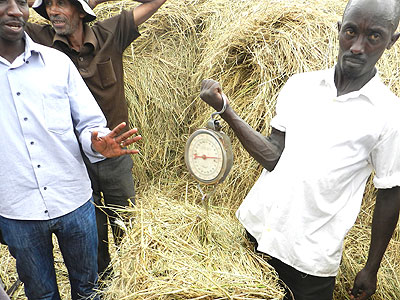Farmers in Rwamagana and Kayonza districts have been trained in silage production by agronomists.


Farmers in Rwamagana and Kayonza districts have been trained in silage production by agronomists.
Silage is conserved grass (or crop) that is made by farmers during rainy season, and conserved to feed animals during the dry season.
According to Dr. Jean de Dieu Ntiyitegeka, the veterinary officer of Rwamagana District, the training aims at modernisation of dairy farming.
Addressing the farmers on Tuesday, Ntiyitanga said much of the grass is wasted during rainy seasons, which leads to pastoralists moving from place to place in search for animal feeds during drought.
"Silage can be produced from ordinary grass…the grass is mowed and allowed to wilt for a day or so until the moisture content drops to a suitable level. It is then deposited in the silo on the day of its cutting. It is a simple process,” he said.
"It is high time we changed our farming ways, particularly feeding animals…over dependence on rain, has for years affected farmers and this can be prevented. Some farmers never understood the process at first, but we believe with time every farmer will embrace silage production.”
Peter Kanamugire, one of the farmers noted that one of the major problems faced by farmers in the two districts was scarcity of pasture during dry seasons.
"There is no doubt that production of silage will save us from suffering…our milk production comes almost to zero, during dry season. The dry grass we feed the cows has changed this…of course cows are not used to this type of feed, but they will slowly adopt,” he said.
Most of the farmers in the districts carry out zero grazing.


